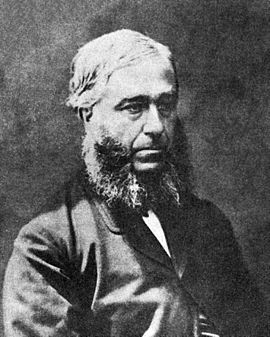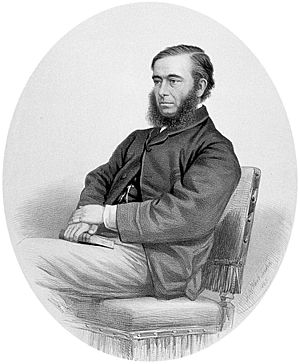William Budd facts for kids
Quick facts for kids
William Budd
|
|
|---|---|
 |
|
| Born | 14 September 1811 North Tawton, Devon, England
|
| Died | 14 January 1880 (aged 68) Clevedon, Somerset, England
|
| Nationality | English |
| Citizenship | England |
| Alma mater | University of Edinburgh |
| Known for | Recognizing contagious nature of infectious diseases. |
| Scientific career | |
| Fields | Physician, Epidemiologist |
William Budd (born September 14, 1811 – died January 9, 1880) was an English doctor. He was also an epidemiologist, which means he studied how diseases spread and how to control them. Budd is famous for figuring out that many sicknesses could spread from one person to another. He realized that tiny "germs" grew inside sick people. These germs could then leave the body, for example, in waste. If these germs got into water, and healthy people drank that water, they could also get sick.
He understood this very well for diseases like cholera and typhoid fever. He learned a lot from the work of another doctor, John Snow, who also studied how cholera spread.
William Budd's Early Life and Schooling
William Budd was born in 1811 in a town called North Tawton in Devon, England. His father, Samuel Budd, was a surgeon, which is a type of doctor who performs operations. His mother was Catherine Wreford.
William went to the University of Edinburgh and became a doctor in 1838. He came from a family of doctors; six of his nine brothers, including George Budd, also became doctors.
Budd's Work as a Doctor
In 1841, Budd moved to Bristol, a city in England, and started working as a surgeon. He later became a physician at St. Peter's Hospital in 1842. Then, in 1847, he started working at the Bristol Royal Infirmary, which is a large hospital.
Budd used his ideas about how diseases spread to help protect Bristol's water supply. He had read about John Snow's work on cholera in London from 1849. Budd believed that tiny living things, which he called "fungoid" organisms, caused cholera. He said these organisms were found in the waste of people sick with cholera.
At that time, many people believed in the "miasma theory." This theory said that diseases were caused by bad air or smells. Because of this, the ideas of Budd and his colleagues, Frederick Brittan and Joseph Griffiths Swayne, were not widely accepted at first.
However, Budd's work made a big difference in Bristol. In 1849, about 2,000 people died from cholera in Bristol. By 1866, after Budd's efforts to improve water safety, only 29 people died from cholera. This showed how important his understanding of disease spread was.


